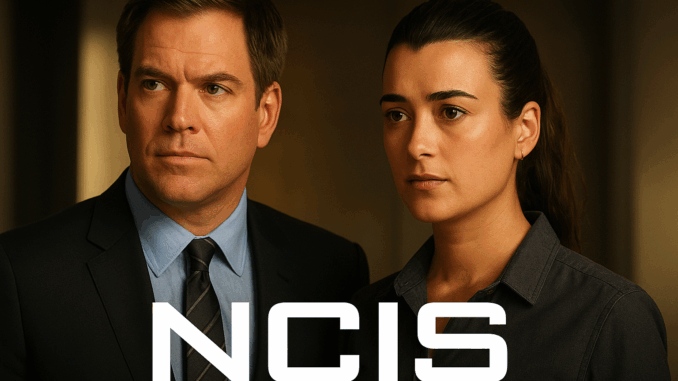
David and DiNozzo still haven’t found themselves on rock-solid romantic footing just yet, with their latest argument arising from Henry’s death in NCIS: Tony & Ziva episode 5. However, an even angrier fight breaks out when Tali finds a gun that Ziva’s hidden in the safehouse. Curiously, this gun plays no role in fighting off Galimard when he later arrives.
Sophie does return fire on Galimard and his fellow goons, so stashing an entirely separate weapon in the house merely to have it disappear later goes against the dramatic principle commonly known as “Chekhov’s gun.” First proposed by playwright Anton Chekhov in 1889, the rule suggests that a loaded rifle should never appear onstage if it isn’t going to fire.So ready for CBS to bring back. Loved the show from Hawaii!! Come on now, CBS, listen to the fans of the show.
It should be noted for the sake of fairness that any “rule” pertaining to the creative arts is sometimes best treated as a suggestion. Chekhov himself famously violates the principle in The Cherry Orchard, and it’s still regarded as one of his most seminal works. Chekov’s gun shaped how writing students learn about setup and payoff, but it’s not infallible.
Ernest Hemingway had his own colorful way of addressing the matter in “The Art of the Short Story”: “This is unlike what you will hear from your instructors, that if a broad comes into a story in the first paragraph, she must reappear later to justify her original presence. This is untrue, gentlemen. You may dispense with her, just as in life. It is also untrue that if a gun hangs on the wall when you open up the story, it must be fired by page fourteen. The chances are, gentlemen, that if it hangs upon the wall, it will not even shoot. If there are no questions, shall we press on? Yes, the unfireable gun may be a symbol. That is true. But with a good enough writer, the chances are some jerk just hung it there to look at. Gentlemen, you can’t be sure. Maybe he is queer for guns, or maybe an interior decorator put it there. Or both.”
In short, there are infinite reasons an apparent setup may not lead to its expected payoff, and the gun’s disappearance from the safehouse in NCIS: Tony & Ziva is effectively justified by Tony’s freakout over Tali’s safety. That said, the gun’s disappearance could have been its own payoff. Tali finds it missing in a moment devoid of conflict, yet moving this reveal to the moment of Galimard’s arrival could have added greater tension to the scene. It’s missed opportunities like this that really highlight the spinoff’s biggest problem.
Television dramas thrive on suspense, foreshadowing, and carefully placed narrative breadcrumbs. But in NCIS: Tony & Ziva Episode 6, the writers did something bold—something many storytelling purists would call “forbidden.” They ignored Anton Chekhov’s age-old writing principle, famously known as Chekhov’s Gun, a rule that’s been guiding writers since 1889. And fans can’t stop talking about it.
In this article, we’ll break down what Chekhov’s Gun is, how NCIS blatantly tossed it aside, and why this choice might not be a mistake at all—but rather, a game-changing risk that could redefine modern TV storytelling.
What Is Chekhov’s Gun? A Quick Refresher
Anton Chekhov, the Russian playwright and short story master, laid down one of the most famous rules in creative writing:
“If in the first act you have hung a pistol on the wall, then in the following one it should be fired.”
In simpler terms: don’t include irrelevant details. If you show a gun, the audience expects it to go off. If you introduce a clue, it must matter later.
It’s not just about guns—it’s about narrative payoff. Everything included should serve a purpose.
The 1889 Rule Meets NCIS: Tony & Ziva
Fast forward more than a century, and Chekhov’s principle is still alive. Writers use it to avoid loose ends, ensuring tight, meaningful stories.
But Episode 6 of NCIS: Tony & Ziva didn’t just bend the rule. It broke it outright.
How Episode 6 Broke Chekhov’s Gun
Without diving into heavy spoilers, here’s the gist:
-
A major object (let’s just say, the “gun on the wall”) was introduced early in the episode.
-
Fans expected it to play a huge role in the climax.
-
Instead, it vanished—no resolution, no payoff, just a dangling piece of narrative furniture.
For longtime NCIS fans, this was shocking. The franchise typically plays by the book with its mysteries and setups. But here, the writers flipped expectations upside down.
Was It a Mistake or a Genius Move?
At first glance, it might feel sloppy. Viewers hate red herrings that don’t pay off. But when you look deeper, this decision could be intentional.
1. Building Realism
Real life doesn’t follow neat storytelling rules. Sometimes guns don’t go off. Sometimes clues mean nothing. By ignoring Chekhov’s Gun, NCIS may be leaning into realism over formula.
2. Subverting Audience Expectations
Audiences today are savvy. They spot foreshadowing instantly. Breaking the rule keeps them guessing, shaking up a predictable rhythm.
3. Setting Up a Future Payoff
What if the “unused gun” isn’t a mistake, but a setup for Episode 7—or even later in the season? By breaking the rule now, the show might be planting a longer narrative seed.
NCIS Has Broken Writing Rules Before
This isn’t the first time NCIS has played loose with classic storytelling devices. The franchise has:
-
Introduced characters who seemed important, only to vanish.
-
Planted evidence that turned out irrelevant.
-
Built up romantic tension (looking at you, Tony and Ziva) for years before finally paying it off.
So, maybe this isn’t sloppy writing—it’s the NCIS way of reminding us they’re still capable of surprise.
Tony & Ziva’s Dynamic: The Real “Gun”
Some argue that the actual Chekhov’s Gun of Episode 6 wasn’t the object at all—it was Tony and Ziva’s relationship.
Their chemistry, lingering tension, and unsaid words are the true “loaded weapon” of the series. And in Episode 6, sparks fly in ways that feel explosive, even without physical triggers.
Fans React: Divided But Engaged
Scrolling through social media after the episode aired, you’ll find two camps:
-
Frustrated fans who call it lazy writing.
-
Thrilled fans who praise the unpredictability.
One tweet summed it up perfectly: “They broke Chekhov’s Gun, but somehow it works. I can’t stop thinking about it.”
Why Breaking Chekhov’s Gun Matters for TV Writing
This isn’t just about NCIS. This could spark a bigger conversation in Hollywood.
Writers often play it safe, sticking to formula. But breaking Chekhov’s rule challenges viewers to engage differently. It dares to say: not every detail matters—and maybe that’s okay.
Does Breaking The Rule Risk Alienating Viewers?
Yes. Some fans tune in for predictable payoffs. They love neat endings. By skipping the resolution, NCIS risks losing those who crave closure.
But in a world of binge-worthy content, unpredictability can be gold. The shock factor might keep more fans watching.
Chekhov’s Gun vs. Modern Storytelling
Back in 1889, readers had shorter attention spans for long, meandering tales. Every detail had to count.
But today, TV shows are sprawling, with seasons spanning dozens of episodes. Writers have room to play with loose threads, knowing they can circle back later.
Other Shows That Have Broken Chekhov’s Gun
NCIS isn’t alone. Some of the most iconic series have bent or broken this rule:
-
Game of Thrones introduced countless objects and prophecies that never paid off.
-
Lost became infamous for dangling mysteries.
-
The Walking Dead often teases threats that fizzle out.
So NCIS is in good company.
What This Means For Tony & Ziva’s Future
Fans should keep one thing in mind: NCIS loves long arcs. What feels like a broken rule today may be part of a master plan.
Tony and Ziva’s journey has always been about slow burn, delayed gratification, and emotional twists. The “gun” might not have fired in Episode 6, but it could explode later—in more ways than one.

The Legacy of Episode 6
Whether you loved or hated the choice, Episode 6 will go down as one of the boldest NCIS moments in years. It broke a 136-year-old principle of storytelling, and people are still debating it days later.
And in TV, that’s the mark of success: people are talking.
Conclusion
NCIS: Tony & Ziva Episode 6 didn’t just tell a story—it challenged one of the oldest storytelling rules ever written. By breaking Chekhov’s Gun, the series stirred controversy, sparked debate, and reminded fans that even after decades, NCIS can still surprise us.
So, was it sloppy writing or a stroke of genius? Maybe it’s both. And maybe that’s exactly why it worked.